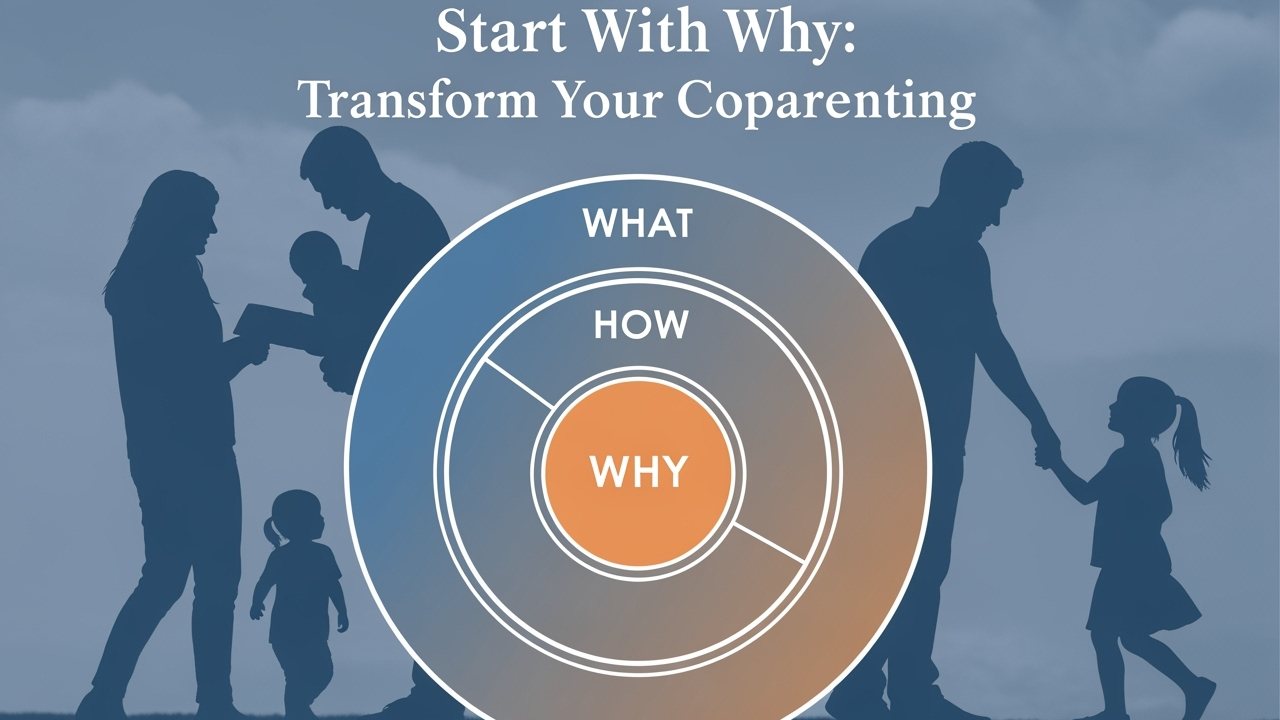Start With Why: How Simon Sinek's Golden Circle Can Transform Your Coparenting Journey
Sep 09, 2025
When your phone buzzes with yet another text from your co-parent about pickup times, school events, or weekend plans, what's your first reaction? If you're like most divorced or separated parents, it's probably frustration, anxiety, or that familiar knot in your stomach.
But what if I told you that a simple business principle could completely transform how you approach coparenting—and dramatically reduce the conflict that's been exhausting you both?
The Golden Circle: More Than Just Business Strategy
Simon Sinek's Golden Circle principle revolutionized how we think about leadership and motivation. At its core, it's beautifully simple: Why → How → What.
- What you do (the actions you take)
- How you do it (your methods and processes)
- Why you do it (your purpose, cause, or belief)
Most people operate from the outside in—starting with what they do and working toward why. But truly inspiring leaders? They start with why.
Here's where it gets interesting for coparents: You and your ex might disagree on almost everything about how to parent and what rules to enforce. But when you dig deeper, you'll likely discover your why is remarkably similar.
Why Your Coparenting Conflicts Miss the Point
Think about your last major disagreement with your co-parent. Was it really about bedtimes, screen time, or which parent handles school pickup? Or was it actually about something deeper—your shared desire to raise confident, secure, happy children?
The problem isn't that you disagree on logistics. The problem is you're starting with logistics instead of purpose.
When you argue about the what and how without first aligning on the why, every conversation becomes a battle of wills. You're both defending your methods without acknowledging you're actually working toward the same goal.
The Magic of Why-First Coparenting
Here's what changes when you flip the script and start with why:
Instead of: "You always let them stay up too late on school nights!"
Try: "I know we both want the kids to succeed in school and feel their best. Can we talk about how to support their sleep needs?"
Try: "I know we both want the kids to succeed in school and feel their best. Can we talk about how to support their sleep needs?"
Instead of: "Your house rules are completely different from mine!"
Try: "We both want to raise responsible kids who feel secure. How can we create consistency while respecting that we parent differently?"
Try: "We both want to raise responsible kids who feel secure. How can we create consistency while respecting that we parent differently?"
Notice the shift? When you lead with your shared why, you're no longer adversaries fighting over territory. You become collaborators working toward a common goal.
Finding Your Coparenting Why
Your why isn't complicated. It's not a mission statement or a parenting philosophy essay. It's the simple, honest answer to this question: What do you want most for your children?
Maybe it's:
- "I want them to feel loved and secure, no matter what"
- "I want them to grow up confident and resilient"
- "I want them to know that both their parents will always be there for them"
The beautiful truth? Your co-parent's why is probably almost identical to yours.
From Why to How: Building Your Coparenting Operating System
Once you've aligned on your why, the how becomes so much clearer. Instead of arbitrary rules and power struggles, you can create systems that serve your shared purpose:
- Communication protocols that keep your children's wellbeing at the center
- Decision-making frameworks that honor both parents' input while prioritizing what's best for the kids
- Conflict resolution strategies that model healthy problem-solving for your children
This isn't about becoming best friends with your ex. It's about becoming effective co-business partners in the most important venture of your lives: raising your children.
The Ripple Effect of Why-First Coparenting
When you start leading with your why, something remarkable happens. Your children stop feeling caught in the middle because there is no middle—just two parents working together toward their wellbeing.
Your stress decreases because you're not constantly defending your parenting choices. Your co-parent becomes less defensive because they don't feel attacked. And your children? They get to experience what they need most: parents who put their needs first, even when it's hard.
Your Next Step
Take five minutes right now and write down your why. Not what you think it should be, but what it actually is. Then, the next time you need to have a difficult conversation with your co-parent, try starting there.
"I know we both want what's best for [child's name]. Can we talk about how to handle this situation in a way that serves that goal?"
You might be surprised by how quickly the conversation shifts from conflict to collaboration.
Ready to transform your coparenting relationship from the inside out? Discover how to align your why with practical strategies that actually work. Book your complimentary consultation and take the first step toward calmer, more connected coparenting.
Cooperative Coparenting Is Possible!
Get started today by downloading my Coparent Communication Essentials.


